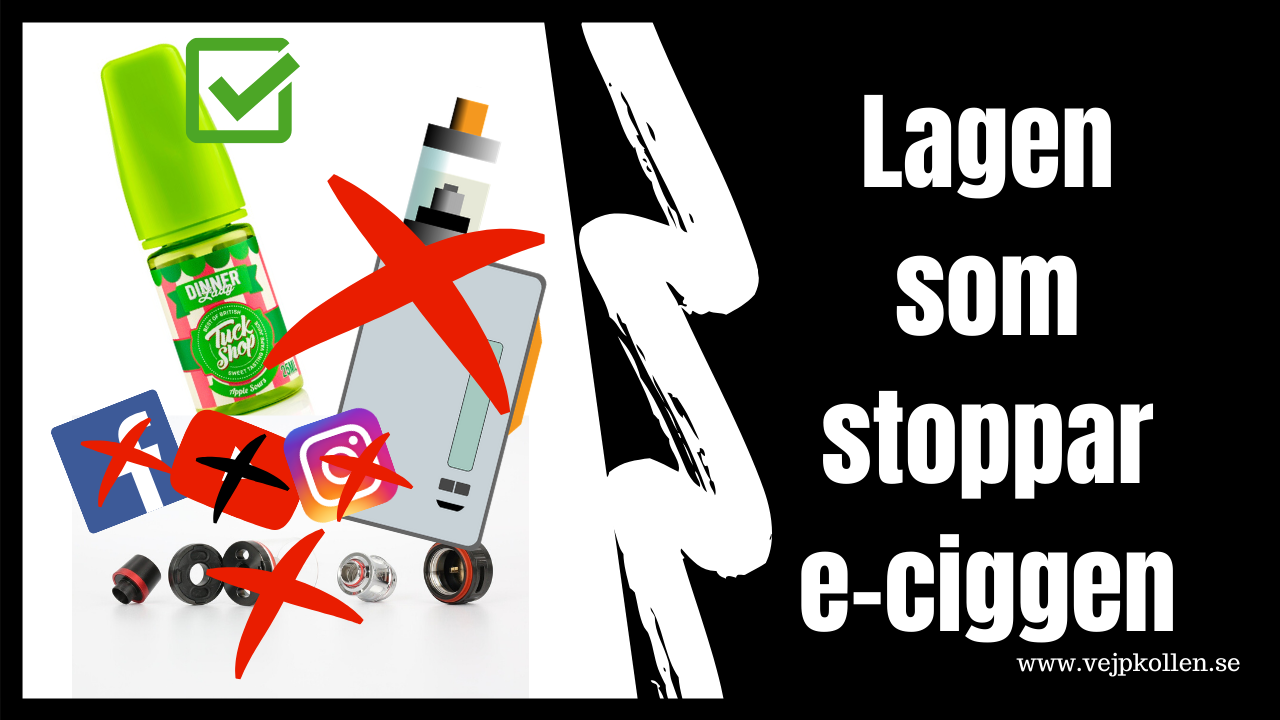Nicotine, mods and tanks cannot be marketed, but green light for shortfills
The ban on e-cigarette marketing often leads to misunderstandings. What does it really mean? Vejpkollen had a chat with Emma Hedge, Legal Officer at the Swedish Consumer Agency.
It is forbidden to advertise nicotine and e-cigarettes in Sweden. The ban also means that classic starter kits as well as mods and tanks are off-limits in shops' adverts.
However, despite the three years of the law, the difference between product categories and unclear definitions of the goods have made it tricky for businesses to know what is actually right and wrong. In addition, there is an exception in the law, which allows some exposure of the products. An exception that leads to misunderstandings, says the Swedish Consumer Agency.
"To put it bluntly, not all companies are fully aware of the rules," says Emma Hedge, a lawyer at the Swedish Consumer Agency specialising in public health, to Vejpkollen.
Neutral descriptions only
To raise awareness, the Swedish Consumer Agency has now officially published special advice on how companies should comply with the law. According to Emma Hedge, it is important to recognise that most marketing in is basically forbidden.
"It's actually easiest to turn it around and start from what companies are actually allowed to do and what the exemption actually means. It is allowed to show the products concerned with a picture and description in connection with sales on a website, but only there. The descriptions must be neutral, for example of a technical nature or flavours, nothing more. Beyond that, nothing is really allowed," says Emma Hedge.
Banners for e-cigs not authorised
So the exemption in the law only applies on the company's website and only in direct relation to a purchase. The link to the purchase is important. So-called sticky banners that lead to a regulated product are therefore also prohibited. The same reasoning applies to social media, such as Facebook and Instagram. No marketing of regulated products is allowed at all, either on companies' own pages or in closed groups.
The ban also applies to "constituents"
In addition to nicotine, the e-cig itself, including the tank, mouthpiece and other 'components' are also bound by the ban.
"In our view, 'components' are what the company is marketing as part of an e-cigarette. However, it can be difficult to define, for example in the case of a battery. After all, it can be used for something else, such as a torch. But we have no legal practice yet and it is possible that we will seek support through court decisions in the future. Emma Hedge.
Clear the way for nicotine-free
However, the Swedish Consumer Agency emphasises that nicotine-free e-juices are not covered by the ban. This means that companies may advertise shortfills on their websites and social media, i.e. e-juices where the customer can choose whether or not to add nicotine. This is a common product in vejp shops and is often featured in adverts, both on and off the websites. And that's perfectly fine, according to the Swedish Consumer Agency.
"Shortfills are not regulated under the Tobacco Act today. However, they fall under normal marketing laws and must not be misleading. Writing "shake n vape" or "shortfill" in an advert is not enough. We recommend "Nicotine Free" or equivalent" says Emma Hedge.
Blogs are allowed - probably
The Consumer Agency also scrutinises other aspects of companies' exposure. Stand-alone texts on the website may not refer to reports or articles that promote the sale of products on the website. The question is how far the prohibition extends.
Is it OK to publish texts on research and health issues related to vejpning on the shops' websites?
"This type of text is not generally prohibited. A text referring to newspaper articles or, for example, authorities is allowed. As long as the text, or what it refers to, does not contain advertising or promote the sale of individual products. But even this is a bit of a grey area. We look at each individual text before making a judgement. It's the purpose of the text that matters - is it meant to be marketing or not? It may need to be tested legally before we know how it complies with the law.
Solutions before conflict
This year, the Swedish Consumer Agency is devoting 1,000 hours to checking whether companies are complying with the law. But according to Emma Hedge the focus is primarily on solutions and not on punishment.
"First and foremost, we are interested in dialogue and seek voluntary corrections. Companies are given a chance to change their marketing and hopefully get it right. Only when we realise that this is not possible, can we decide to go to court." says Emma Hedge to Vejpkollen.




